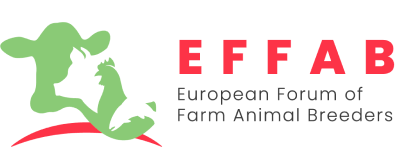EU Research Projects
Over the last year, EFFAB is currently involved in 9 different European research projects, and is also working on new proposals under different calls.
Discover all the projects we are involved in

- Read more
- Read more
- Read more
- Read more
- Read more
- Read more
- Read more
- Read more
- Read more
- Read more
- Read more
transformdairynet
TransformDairyNet will unite farmers, researchers, and industry experts to promote cow-calf contact (CCC) dairy systems that prioritize animal welfare, environmental sustainability, and economic viability. TransformDairyNet harnesses the expertise of 26 European partners from 14 countries. Together, they will mobilize 11 National Innovation Practice Hubs and a European Knowledge and Innovation Network. This network will comprise of dairy farmers, veterinarians, advisors, supply chain actors, farmer organizations, researchers, and policymakers, all collaborating to enhance and scale up CCC dairy production and beyond. This will include compiling existing CCC knowledge ready for practice, identifying end users needs, and co-creating new CCC knowledge through funding innovation.
EUAqua.org
The mission of EUAqua.Org is to invigorate Organic Aquaculture in Europe by adopting a problem-solving ethos and pioneering highly innovative solutions to fill key knowledge gaps and overcome the primary factors limiting the competitiveness of Atlantic salmon, European sea bass, gilthead sea bream, and rainbow trout organic production.
Step up
Currently, there is a lack of comprehensive and quantifiable information regarding the sustainability and resilience of environmentally friendly European Livestock Production Systems (ELPS). STEP UP is addressing this gap by accessing and analysing Innovative Livestock Production Systems (ILPS) as a testing ground. ILPS incorporate technology-driven approaches to enhance efficiency, reduce environmental impact, and improve animal welfare. STEP UP aims to identify data deficits and upgrade traditional ELPS based on insights gained from ILPS, contributing to a more informed and sustainable livestock farming approach.
DETECTIVE
The overall aim of the project is to develop, validate and promote innovative detection methods for plant and animal products using new genomic techniques (NGTs) such as gene editing and cisgenesis. This will support the traceability, authenticity and transparency of NGT products.
Digi4Live
Digi4Live aims to address these challenges by empowering participants in the European livestock sector, enabling them to leverage data generation and digital technologies to their benefit. The project seeks to enhance the adoption of digital technologies and utilize diverse data sources for various livestock, including pigs, poultry, cattle, and sheep. With a comprehensive approach, Digi4Live impact sectors that cover over 35% of the total agricultural output value in the European Union.
HOLICOW
HoliCow was born from the observation of a dramatic decrease in the number of small and medium-sized dairy farms in our territories. This decrease is multifactorial. First, access to technologies is complicated for these farms because of the investment and time needed to understand them. This leads to economic losses and lower resilience of the animals and farms. A second reason for the decrease of farm number is the detrimental opinion of the general public. Indeed, agri-bashing is very common nowadays, discouraging farmers to continue their activities.
Given the importance of these farms to maintain our landscapes, biodiversity and resilience, HoliCow partners decided to join forces to allow these farms to use affordable tools to improve their resilience and stay in business. In addition, a promotional campaign is planned to strengthen the relationship of the farmers and their local community.
Concretely, the partners previously achieved to predict biomarkers related to health, welfare, heat stress, methane emissions and other traits using the milk composition, and in particular the mid-infrared spectroscopic analysis. Now all these predictions will be gathered to create an easy-to-understand indicator to assess farm resilience. A community database will be created for farmers to help them answer the problems highlighted, with continuous improvement of the platform using feedback from users.
RUMIGEN
RUMIGEN aims to provide future breeding goals and programs, innovative genomic prediction methods and precision management tools to optimise long-term genetic improvement and maintenance of genetic diversity in ruminants.Towards these aims, RUMIGEN will ensure engagement of a variety of stakeholders to assess social perception of breeding objectives and related technologies in ruminants. It will define “rooms of acceptance” which will be implemented in sustainable breeding scenarios that will then be assessed through multi-actor panels. It will question trade-offs and pleiotropic effects through adaptation to environmental stressors such as heat stress in cosmopolitan and local dairy cattle breeds. In addition, RUMIGEN will answer questions on genome editing specificity and safety issues, assessing its potential to preserve genetic diversity and increase genetic gains.
GERONIMO
GEroNIMO will provide pig and chicken breeders with new knowledge and tools to promote innovative genome and epigenome-enabled selection methods for Efficient Livestock Production (ELP) traits such as feed efficiency and fertility for cosmopolitan and local breeds. The project will contribute to developing sustainable and welfare-friendly animal systems by improving knowledge of (epi)genome-to-phenome relationships, taking into account genetic and non-genetic mechanisms and epigenetic diversity. It will also evaluate the social acceptance of the use of genomic innovations in monogastric breeding, including related ethical and legal dimensions.
PIGWEB
The aims of PIGWEB are to strengthen the pig research community by providing and facilitating access to Research Infrastructures (RI), reinforce a culture of cooperation between the research community and industrial and societal stakeholders, and improve and integrate the services provided by the RI. This will contribute to develop innovative and ethical solutions for sustainable pig production systems. The consortium provides the technical and scientific skills on key disciplines essential to assess and develop pig production as an element in the sustainable development of food production.
HoloRuminant
HoloRuminant will expand our understanding of ruminant-associated microbiomes to fill knowledge gaps and develop tools for their interpretation. With its holistic multi-omics approach, the project will study the multiple interactions of the ruminant-associated microbiomes with the host animal in early life and throughout fundamental life events. The aim is to decipher the characteristics and functions of livestock microbial ecosystems from different body sites, their heritability and their influence on the host’s resistance to disease and environmental efficiency of production (e.g., efficiency, disease resistance and resilience to changing environmental conditions). HoloRuminant will provide highly innovative, standardized methodologies that will radically advance our understanding of the ruminant holobiont. This knowledge and the tools created will allow the use of microbiome-based diagnostics and solutions for improving ruminant sustainability.
EUROFAANG
By establishing EuroFAANG, the H2020 projects GEroNIMO, AQUA-FAANG, BovReg, GENE-SWitCH, Rumigen and HoloRuminant have formed a closer relationship to coordinate their objectives within Europe in association with the international FAANG initiative. EuroFAANG brings together a wide range of expertise in farmed animal biology and breeding, genomics, bioinformatics, modelling and open data, as well as multiple platforms for dissemination and outreach, with a common goal to discover links between genome and phenome (i.e. G2P) in the frame of the FAANG to Fork strategy.
